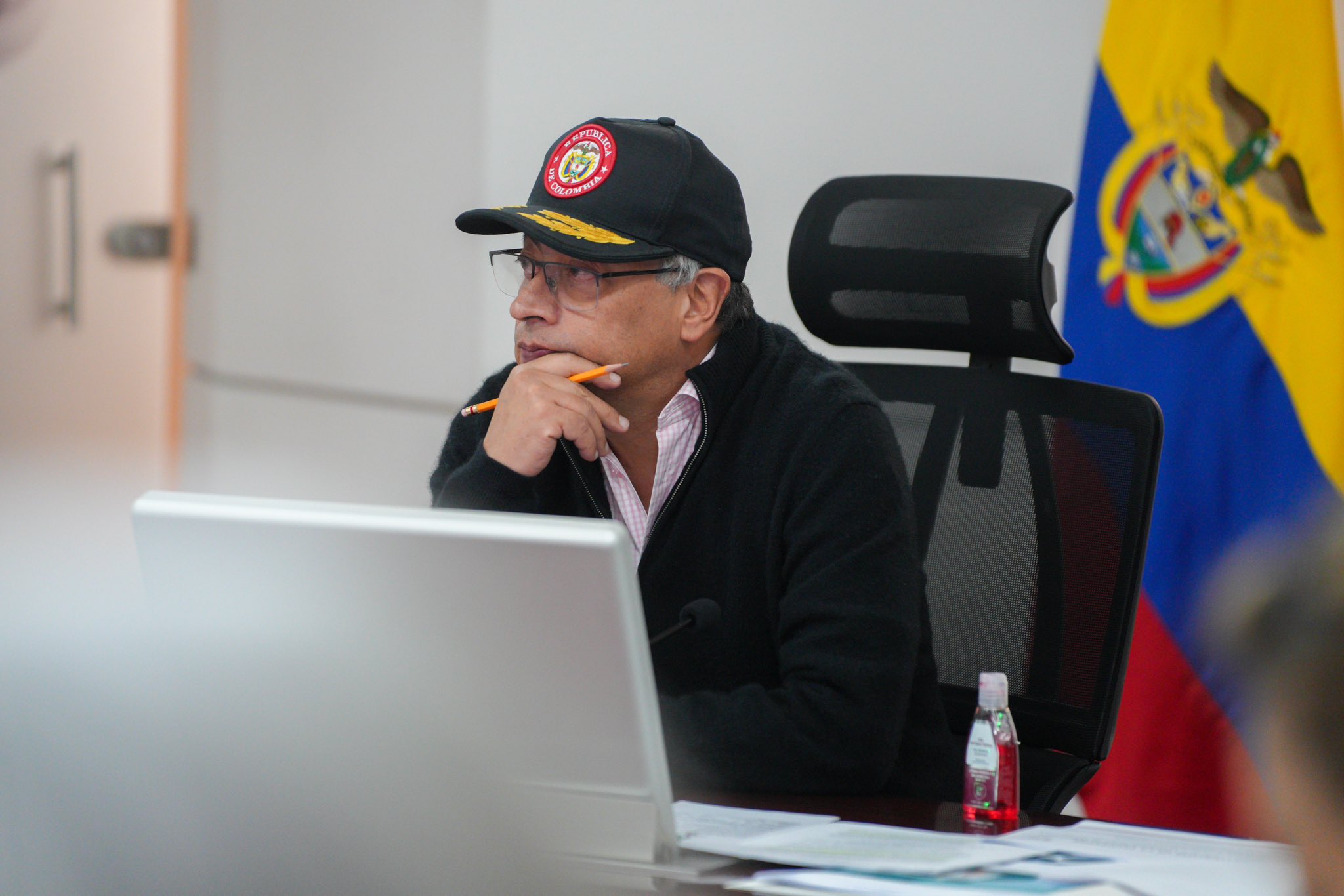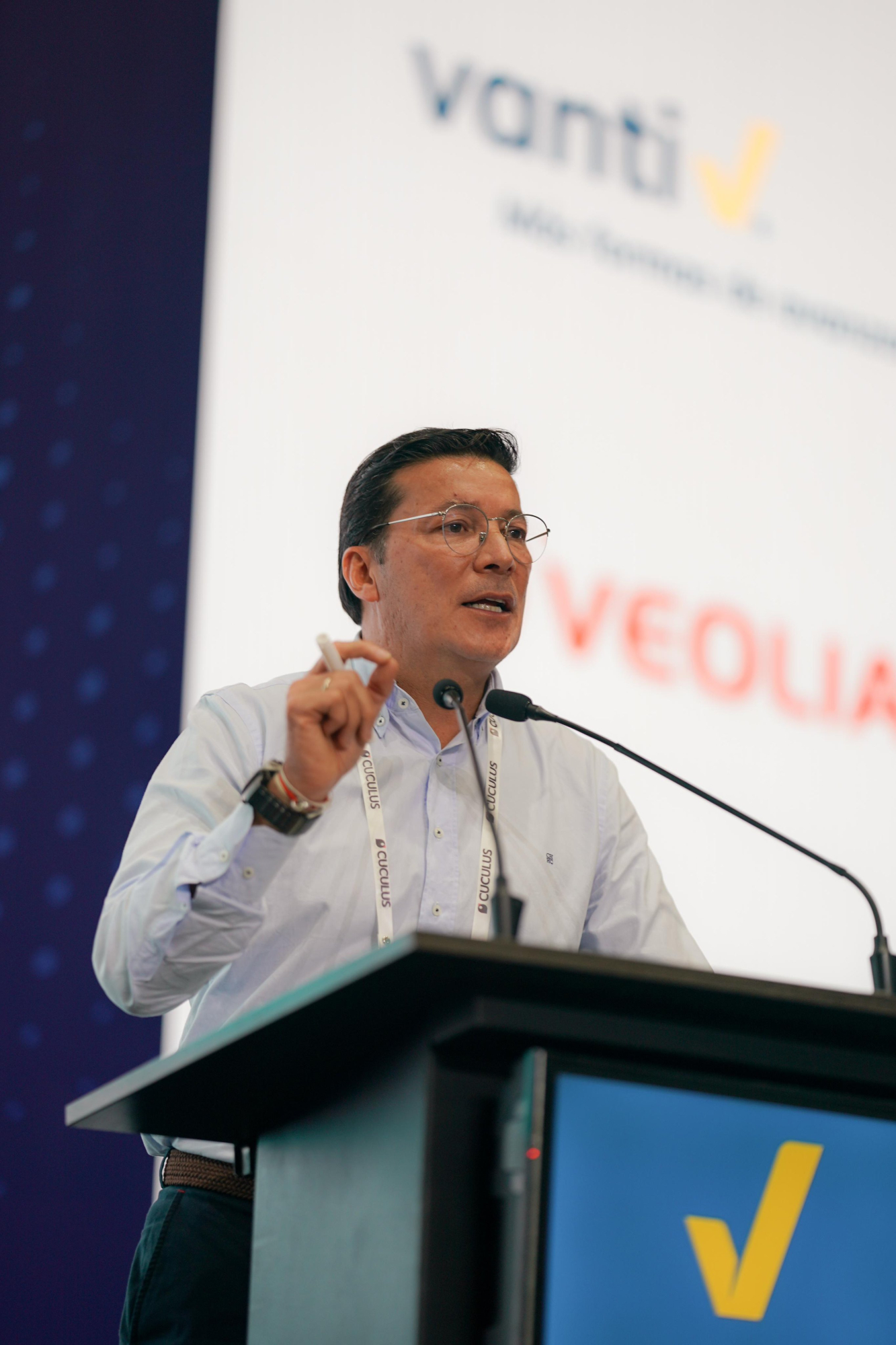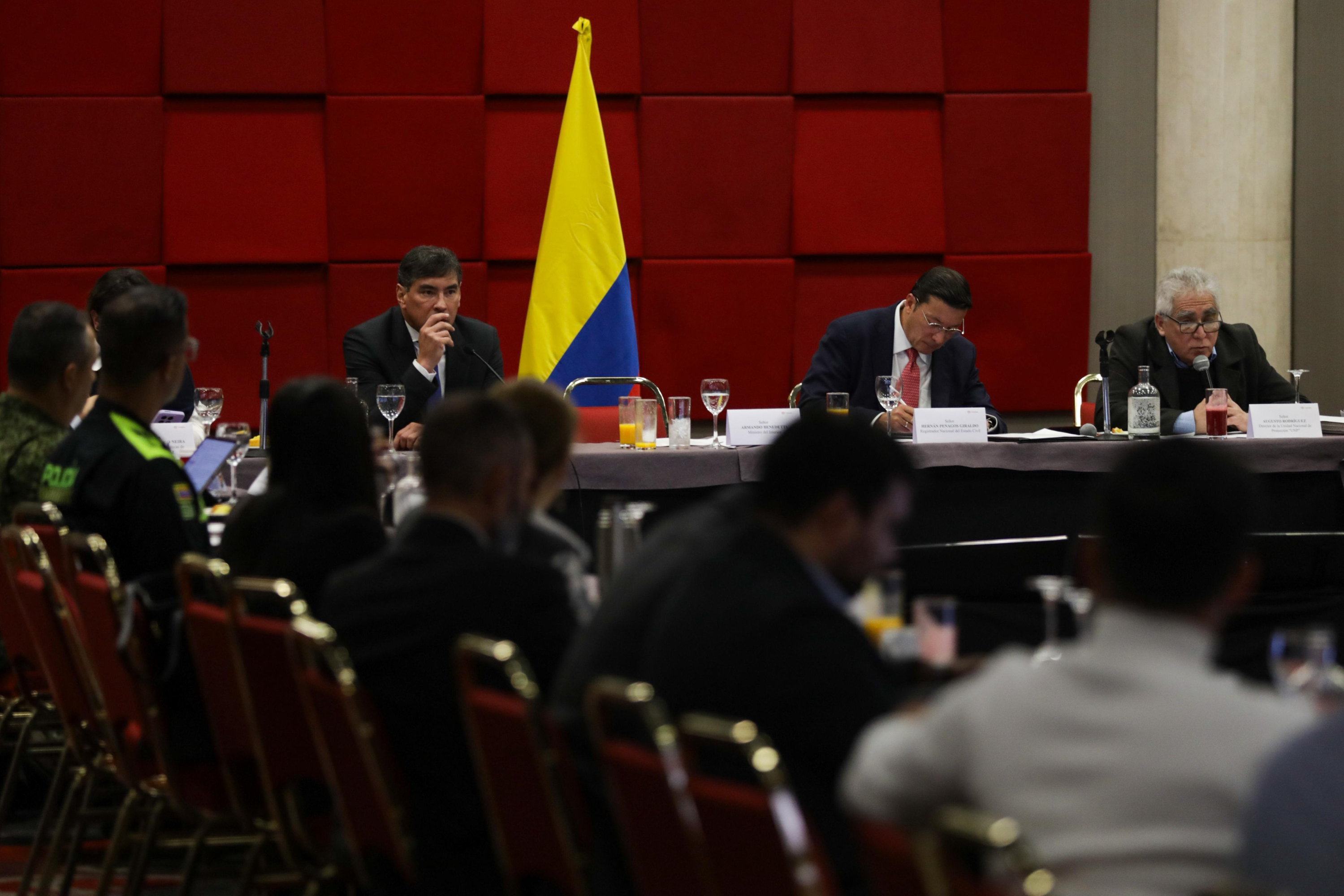Security and ID card registration: the EOM's concerns ahead of next year's election process

The Electoral Observation Mission (EOM) assessed the logistics contract awarded by the Registry Office on Wednesday to Thomas Greg and Sons for the upcoming elections, which amounts to 2.1 billion pesos. Diego Rubiano, coordinator of the EOM's Political Observatory, in an interview with EL TIEMPO, emphasized that on this occasion, the contract was signed earlier and included the support of oversight bodies—such as the Attorney General's Office—as well as the participation of technical committees with electoral observers.
He also noted that current concerns ahead of the elections center on the deteriorating security situation and the increase in violent actions by armed groups. Rubiano added that they have also issued alerts regarding the ID card registration process, which, although improved compared to 2021, presents potential irregularities in 52 municipalities.
What is the MOE's analysis of President Petro's statements questioning the electoral process? The process must be fully analyzed. At this time, we're talking about a process that is being awarded, which doesn't involve the signing of a contract, although everything seems to indicate that it will be that way, which is how it has traditionally operated. Now, obviously, a much more comprehensive judgment must be made regarding the transparency of the elections, and in our opinion, it's a somewhat hasty judgment when referring to the transparency of the electoral process. We don't know exactly what this value judgment is being made about, and, obviously, the components of the contract are quite broad. Nearly 16 election-related goods and services are being contracted, ranging from the construction of technological solutions or software support to the printing and deployment of all the election kits. So, making a value judgment in that sense is quite complex without understanding what the contract entails.

Gustavo Petro, President of Colombia, during a cabinet meeting. Photo: Presidency
In this case, we're talking about a fairly extensive contract that basically seeks to provide a comprehensive solution for the entire electoral process. In that case, we're talking about a pool of 16 goods and services that include, for example, the construction of technological platforms to support citizen registration, the process of registering ID cards, the registration of significant groups of citizens, obviously, software provisions for the pre-count and electoral data consolidation processes, technical support for software for consolidating vote count results, printing ballots and aids for voting jurors, and, in general, the electoral kit, in addition to all the digitization processes. That, broadly speaking, is what's included in this contracting process.
How will the bidding process work? In this case, what we have is a cluster of seven companies that are part of this temporary union that participated in the selection process. Thomas Greg Limited is like its parent company or largest company, but it also includes other subsidiaries such as Thomas Greg Colombia, Thomas Processing & Systems, and Thomas Greg Express. Security companies like Transbank, which provide all valuables transportation services, and everything related to, for example, telecommunications networks, are part of the Colombia Telecommunications Temporary Union, with Telefónica as a brand. So, that's basically what's involved in this hiring process, and what the companies make is an agreement based on their capabilities and experience.
Is all of that delivered in one package? Yes, everything is under the temporary union. It's no small feat that the temporary union is used; it's important to keep in mind that all 16 goods and services are delivered packaged in the same contract. That's why it's such a large contract: 2.1 trillion pesos, which also covers the entire electoral cycle: Congress, the Presidency, the first round and second round, if there is one, and even part of what has to do with this year's youth councils.
President Petro insists on sowing doubts about Thomas Greg and insists that they will be in charge of the counting process. Is that correct? An important caveat is to understand how the vote count and the generation of results work. In this case, we must keep in mind that the vote count process is carried out by judges and notaries of the Republic. In this case, the Temporary Union for Electoral Logistics Integration, as they decided to call it, is responsible for providing the technological solutions onto which this information is entered. So we're talking about an information system into which the digitization is performed, but this is done by officials from the Registry within the framework of the counting committees, which in this case function as secretaries, and it is verified by judges and notaries of the Republic.
What is your assessment of this particular contract and how it was awarded? In this case, what we found was a selection process that was carried out using an abbreviated selection process and that did have some important advances compared to previous processes. For example, we are talking about a process that was brought forward by about two months at the time of hiring, which did not occur, for example, in 2022. This represents an important window of opportunity in terms of contract execution, deadlines for the contractor, and, obviously, audits, both external and by the Registry Office, and, obviously, the entire audit process carried out by both political organizations and electoral observation organizations. That is an important detail; it is key that this process was brought forward and executed with better and longer timeframes to be able to take this contract execution into account.

The national registrar, Hernán Penagos. Photo: Registry Office
Secondly, we are talking about a process that has been supported not only by electoral observation organizations through technical committees, but also by oversight bodies. The Registry has been very careful with this bidding process and has also invited the Attorney General's Office and other oversight bodies to participate, for example, in the selection tests, in the technical tests administered to the contractor for the selection process itself. These are important elements when examining how this contracting process went.
The president also questioned what he sees as a monopoly by Thomas Greg, and what we're seeing is that they're increasingly tasked with more tasks. How do you analyze this? We've been tracking electoral procurement since 2007, and in this case, particularly since 2011, we've seen that Thomas Greg companies and their subsidiaries have been gaining ground. But let's say this is completely normal due to the market situation in Colombia. Previously, we found, for example, companies from the Colombian Carvajal group in these processes, but by decision of the board of directors, they no longer participated in electoral procurement processes, and this gave Thomas Greg companies a much larger and broader market space.
But this is a completely normal effect of that market situation. So, they have the capacity. What I'm saying is, Thomas has participated to a greater or lesser extent in Colombia's electoral processes since 2007. It's not a participation with minor experience, and obviously, that has led him to have a much greater role and participation in these contracting processes.
There are also criticisms about the software purchased by the Registry, and Petro also links it to Thomas. Who really provided it? Indra, which is another of those providers in terms of electoral software, last participated in our electoral process through the sale of software in 2021. Software that is already owned by the state and is currently under the management of the National Electoral Council. Its participation has been completely normal in the Colombian process, and we assume this software will be used in these elections. It remains to be seen whether there will be any kind of update or what will happen with this acquisition, which was made four years ago.
How do you analyze the law that regulates political polls in Colombia? We participated in the discussion process, especially in the Senate, and from a technical perspective, we've analyzed that this bill will become necessary because we haven't had sufficient regulations since Law 996 of 2005 to address this situation. So, it's an important step forward in technical terms, particularly because we're talking about opinion polls and voting intention surveys with much stricter technical criteria. We've stated that national surveys must have a maximum margin of error of 3% and a reliability margin of 95%, which is a sensible and serious technical criterion for studies of this magnitude.
For example, it improves the conditions and obligations that polling firms must adhere to when selecting municipalities for their samples for these studies or surveys, which is important to avoid generating biased studies in terms of territory or demographic and population concentration. Additionally, it is important to consider the strengthening or boost given to the CNE through the creation of the Technical Oversight Commission. It is worth mentioning that, aside from registration with polling firms, the CNE unfortunately did not have the capacity to exercise much stronger oversight, which this law does grant it.

In the background are the president of the National Electoral Council (CNE), the National Registrar, and the director of the National University of Puerto Rico (UNP). Photo: César Melgarejo. EL TIEMPO
At this moment, there are two issues we are monitoring and issuing the necessary alerts to the authorities. One, obviously, is the issue of security. There is a significant escalation in conflict actions committed by groups outside the law, and this is a situation that must be addressed with the necessary urgency, while there is still time. We are still working to coordinate the Public Forces and the electoral organization to address this situation, and it is a situation that cannot be ignored.
Secondly, we have also monitored the ID card registration process, which, while currently reporting only 55,000 registered people, does represent an increase compared to 2021, when we had 64% fewer registered people. We have issued an alert regarding 52 municipalities, for which we suggest the Attorney General's Office and the National Electoral Council (CNE) conduct the respective review of these registrations.
In terms of security, we witnessed an attack on a candidate in Bogotá, but you often report on cases of political violence in your reports. What's your assessment of this election process? Indeed, exactly a week ago, we published the report on violence against political, social, and community leaders, and there we presented a situation in which we recorded 134 incidents of violence against leaders between January 1 and May 8, 2025.
This situation, while representing a decrease of approximately 18% compared to the same period in 2021—the closest pre-election year—is still a situation that requires attention. Especially considering that of those 134 incidents, 58 are against political leaders, particularly council members and sitting mayors, who are being violated in each of their territories. Specifically, we have warned that this situation is concentrated in the Citrep territories, particularly in the department of Cauca, for example.
What issues were brought before the Electoral Process Monitoring Commission? The EOM, as invited by civil society, presented a report to this committee, in which it addressed specific issues. First, everything related to this contracting process, the EOM's analysis of the abbreviated selection process conducted by the National Civil Registry, and what we already discussed regarding the analysis of the process, what happened with the bidders, and what relates to the provision of this comprehensive solution.
Secondly, we addressed the entire issue of security, which is one of the important variables we face at this point in the process and one that we must ensure is addressed by both the Public Force and the electoral organization. And then, obviously, we must address other issues required by this committee regarding the municipal youth councils. We will request the creation of a special electoral monitoring committee for this matter, since the elections are just over three months away and we have not yet seen any decisive action from the state organizations.
CAMILO A. CASTILLOPolitical EditorX: (@camiloandres894)
eltiempo





